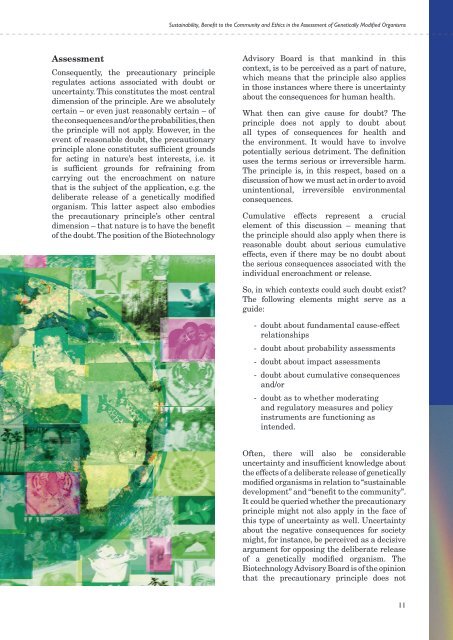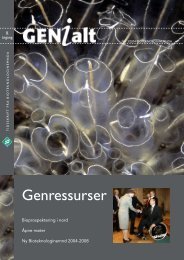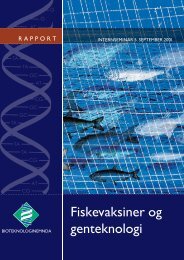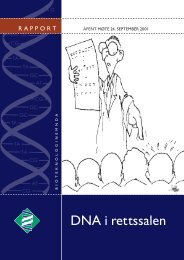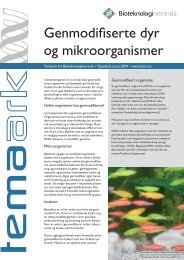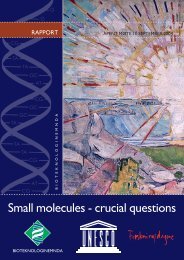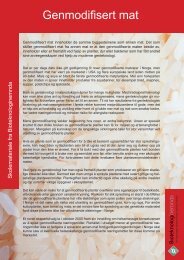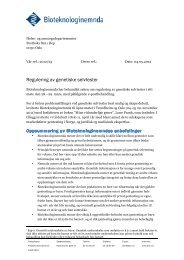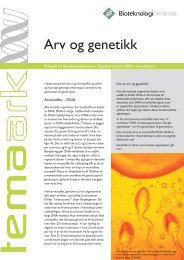Sustainability, Benefit to the Community and Ethics
Sustainability, Benefit to the Community and Ethics
Sustainability, Benefit to the Community and Ethics
- No tags were found...
You also want an ePaper? Increase the reach of your titles
YUMPU automatically turns print PDFs into web optimized ePapers that Google loves.
<strong>Sustainability</strong>, <strong>Benefit</strong> <strong>to</strong> <strong>the</strong> <strong>Community</strong> <strong>and</strong> <strong>Ethics</strong> in <strong>the</strong> Assessment of Genetically Modified OrganismsAssessmentConsequently, <strong>the</strong> precautionary principleregulates actions associated with doubt oruncertainty. This constitutes <strong>the</strong> most centraldimension of <strong>the</strong> principle. Are we absolutelycertain – or even just reasonably certain – of<strong>the</strong> consequences <strong>and</strong>/or <strong>the</strong> probabilities, <strong>the</strong>n<strong>the</strong> principle will not apply. However, in <strong>the</strong>event of reasonable doubt, <strong>the</strong> precautionaryprinciple alone constitutes sufficient groundsfor acting in nature’s best interests, i.e. itis sufficient grounds for refraining fromcarrying out <strong>the</strong> encroachment on naturethat is <strong>the</strong> subject of <strong>the</strong> application, e.g. <strong>the</strong>deliberate release of a genetically modifiedorganism. This latter aspect also embodies<strong>the</strong> precautionary principle’s o<strong>the</strong>r centraldimension – that nature is <strong>to</strong> have <strong>the</strong> benefi<strong>to</strong>f <strong>the</strong> doubt. The position of <strong>the</strong> BiotechnologyAdvisory Board is that mankind in thiscontext, is <strong>to</strong> be perceived as a part of nature,which means that <strong>the</strong> principle also appliesin those instances where <strong>the</strong>re is uncertaintyabout <strong>the</strong> consequences for human health.What <strong>the</strong>n can give cause for doubt? Theprinciple does not apply <strong>to</strong> doubt aboutall types of consequences for health <strong>and</strong><strong>the</strong> environment. It would have <strong>to</strong> involvepotentially serious detriment. The definitionuses <strong>the</strong> terms serious or irreversible harm.The principle is, in this respect, based on adiscussion of how we must act in order <strong>to</strong> avoidunintentional, irreversible environmentalconsequences.Cumulative effects represent a crucialelement of this discussion – meaning that<strong>the</strong> principle should also apply when <strong>the</strong>re isreasonable doubt about serious cumulativeeffects, even if <strong>the</strong>re may be no doubt about<strong>the</strong> serious consequences associated with <strong>the</strong>individual encroachment or release.So, in which contexts could such doubt exist?The following elements might serve as aguide:- doubt about fundamental cause-effectrelationships- doubt about probability assessments- doubt about impact assessments- doubt about cumulative consequences<strong>and</strong>/or- doubt as <strong>to</strong> whe<strong>the</strong>r moderating<strong>and</strong> regula<strong>to</strong>ry measures <strong>and</strong> policyinstruments are functioning asintended.Often, <strong>the</strong>re will also be considerableuncertainty <strong>and</strong> insufficient knowledge about<strong>the</strong> effects of a deliberate release of geneticallymodified organisms in relation <strong>to</strong> “sustainabledevelopment” <strong>and</strong> “benefit <strong>to</strong> <strong>the</strong> community”.It could be queried whe<strong>the</strong>r <strong>the</strong> precautionaryprinciple might not also apply in <strong>the</strong> face ofthis type of uncertainty as well. Uncertaintyabout <strong>the</strong> negative consequences for societymight, for instance, be perceived as a decisiveargument for opposing <strong>the</strong> deliberate releaseof a genetically modified organism. TheBiotechnology Advisory Board is of <strong>the</strong> opinionthat <strong>the</strong> precautionary principle does not11


